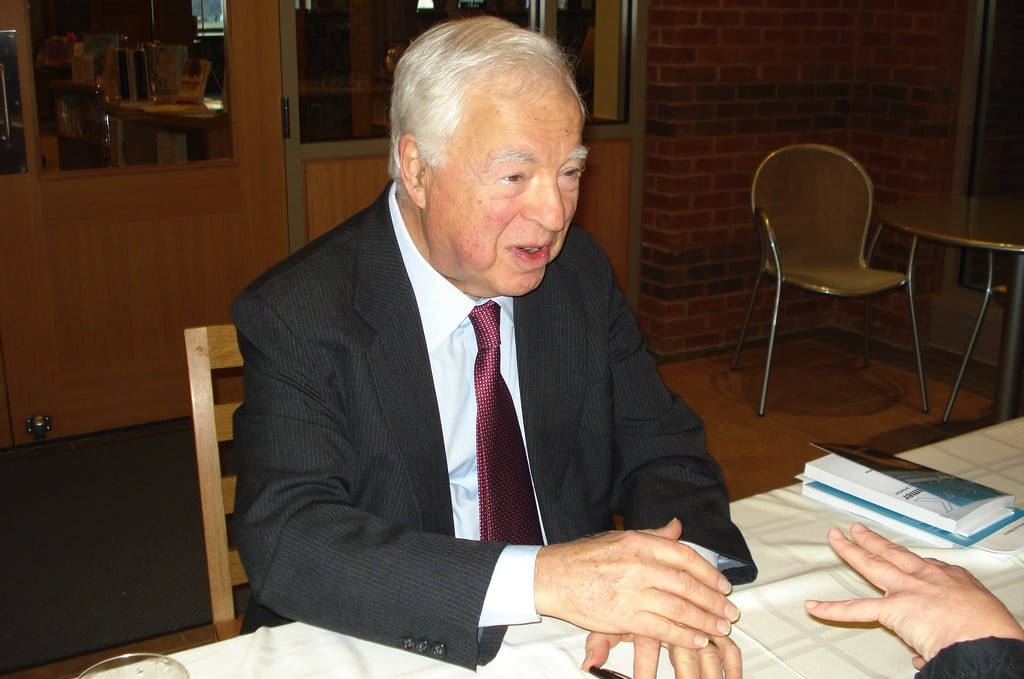Arthur Frommer gets his brand name back from Google

Skift Take
Arthur Frommer has regained the right to publish the guidebooks and run the travel website that bears his name.
The guidebook founder confirmed the return of the name to the Associated Press’ travel editor Beth Harpaz in a phone call late Wednesday night. No price for the naming rights was disclosed.
A Google spokesperson acknowledged the arrangement to Skift: “We’re focused on providing high-quality local information to help people quickly discover and share great places, like a nearby restaurant or the perfect vacation destination. That’s why we’ve spent the last several months integrating the travel content we acquired from Wiley into Google+ Local and our other Google services. We can confirm that we have returned the Frommer’s brand to its founder and are licensing certain travel content to him.”
The story
In late March Skift broke the news that Google was not going to continue publishing books with the Frommer’s Travel name, and at the end of March only one employee was left manning the controls at the almost silent Frommers.com website. Long-time authors reported receiving the silent treatment or were asked to submit writing tests to see how well they executed the Zagat writing style. In messages to Skift these authors reported being “annoyed” and “insulted” by the request for writing samples.
When the sale of Frommer’s Travel to Google by Wiley was made public on August 13, Arthur Frommer told Skift, “I couldn’t be more delighted. The energy, resources, and talent of the Google team will allow the Frommer’s brand to reach new levels of popularity.”
That excitement turned to disappointment relatively quickly as Google showed early signs that it only wanted the guidebook content and the team that creates and manages it rather than the brand itself. As early as November, discussions between Arthur Frommer, Wiley, and Google were growing contentious. Arthur Frommer received payments from Wiley — as he did from Simon & Schuster and IDG Books previously — based upon the sale of products bearing the Frommer’s trademark. If there was no book series and no website there would be no royalties.
More on Guidebooks:
- Google quietly pulls plug on Frommer’s print travel guidebooks
- UPDATED: Lonely Planet and the rapid decline of the printed guidebook
- Wiley confirms Google paid $22 million for Frommer’s — even less than previously believed
The staff behind the website was laid off shortly after the acquisition, alongside the people responsible for book production. Still, the website chugged along with minimal maintenance and some new copy until the end of 2012. But the shutdown seemed imminent following silence on the Frommers.com website after the new year and then a lack of new titles in stores starting in mid-February.
With the exception of Arthur Frommer’s own blog, the site has not published new material since December 31, and frequent contributors such as consumer advocate Christopher Elliott and cruise expert Matt Hannifin posted farewell notices.
In early March, Zagat’s travel blog began publishing stories more frequently than before. Many of these stories are based on content previously published on Frommers.com.
Google attempted to shift the large forum community at Frommers.com to a new community at Google Plus. The new community has grown to 107 members since its January launch; the existing Frommers.com community was not as large as Lonely Planet’s Thorn Tree fourm but it was in the tens of thousands of active users.
Earlier in December, Google began adding Frommer’s reviews to the Google Plus product without attributing them to the travel guide.
What’s next?
Although Arthur Frommer now controls the name, he will need to start from scratch on the content front. Google is already making use of reviews in the Google+ Local product and Zagat.com is running old Frommers.com copy. Google is not specific on the “certain” content it will allow him to use, but it is likely not the tens of thousands of reviews, narrative copy, or images the search giant acquired from Wiley.
Arthur Frommer’s daughter Pauline Frommer will likely play a pivotal role in the “new” Frommer’s. She spearheaded a series of well-received, award-winning guidebooks for Wiley that had that misfortune of launching just as the industry was seeing some of its worst days. She has a deep Rolodex and a high profile as a travel industry expert to lean on. Pauline Frommer was involved with the early days of Frommers.com, as well as Arthur Frommer’s Budget Travel magazine until shortly after the Washington Post purchased the magazine. Ironically, Budget Travel is currently on the block now having hit rock bottom. While a total family reunion seems far-fetched, the BT sellers are desperate.
But what company will do the traditional book publishing for the Frommers is the big question. There aren’t many publishers that don’t already have a guidebook series or that haven’t turned their back on the game. Wiley is obviously out, and the combined Penguin/Random House group already has a handful with Fodor’s, Rough Guides, and DK, among others.
One standout possibility: Avalon Travel, which publishes the Moon Handbooks and the Rick Steves series. While it’s never been one of the top publishers in the U.S., it did not experience the reverse hockey stick declines of 30-40% in sales that its guide peers have seen since 2006, and is only down in sales less than 2% over the same period. It also knows how to manage a travel legend like Arthur having had a long relationship with Steves, who has turned down offers to leave Avalon for other, bigger outfits.




